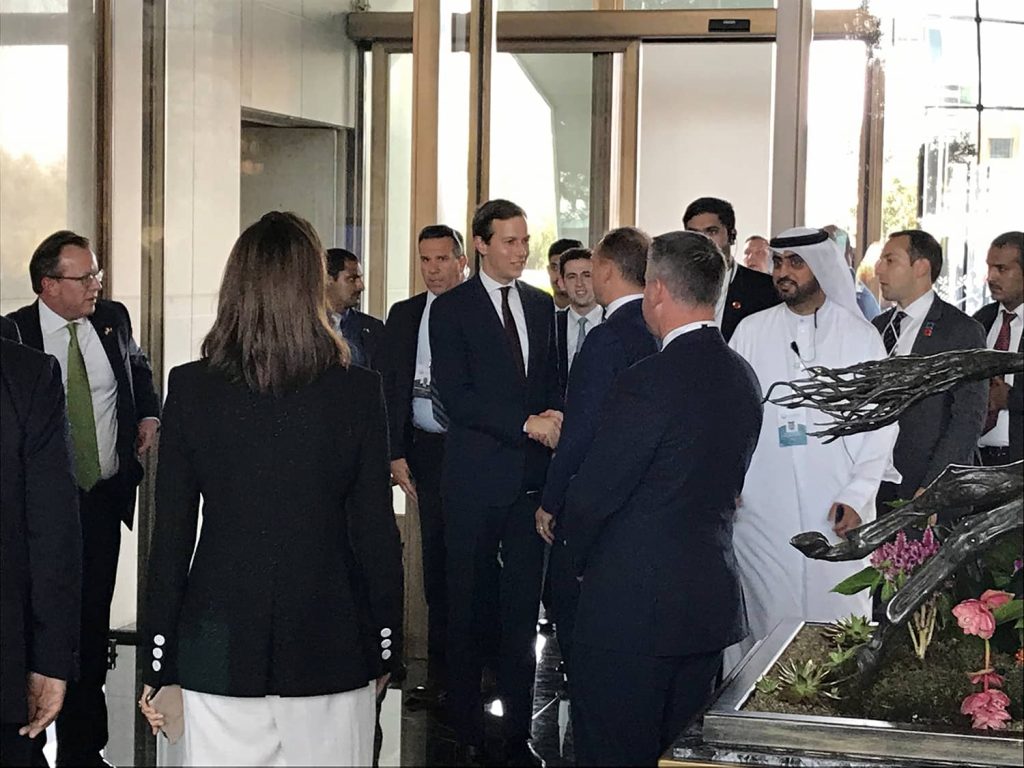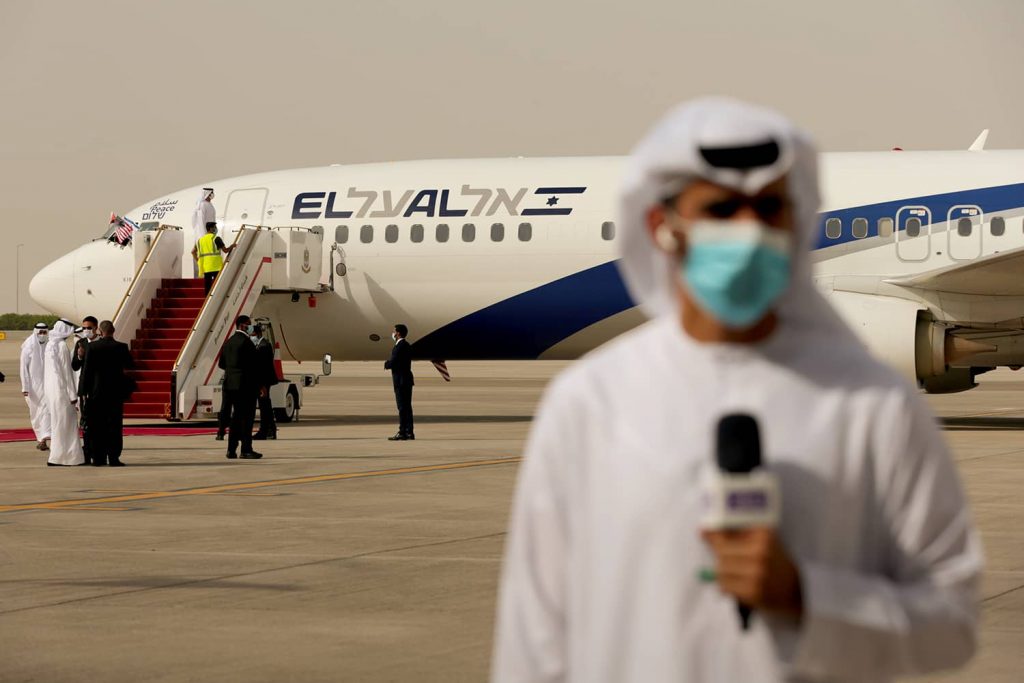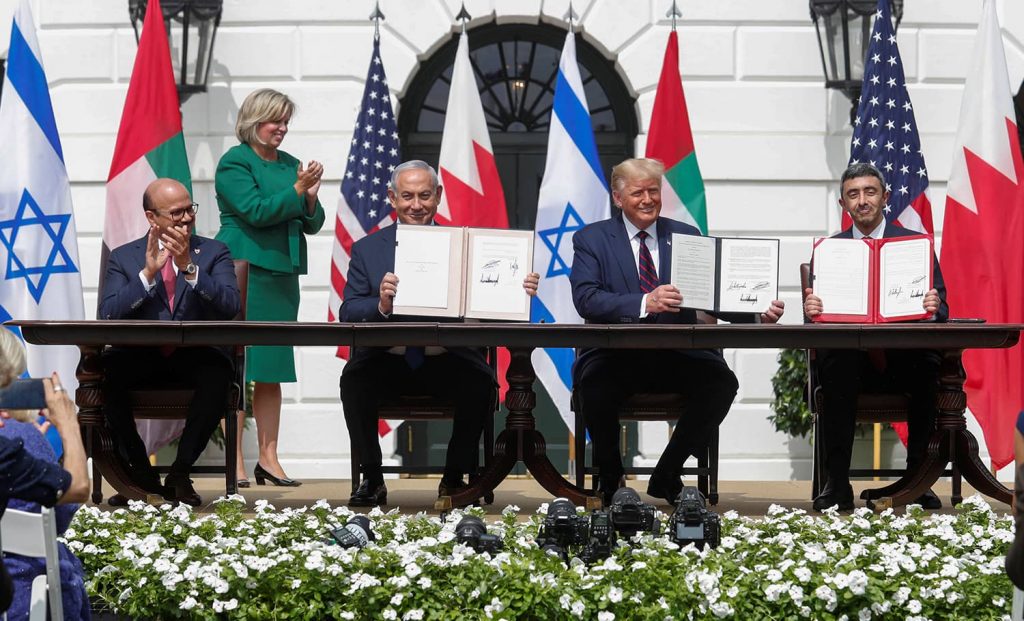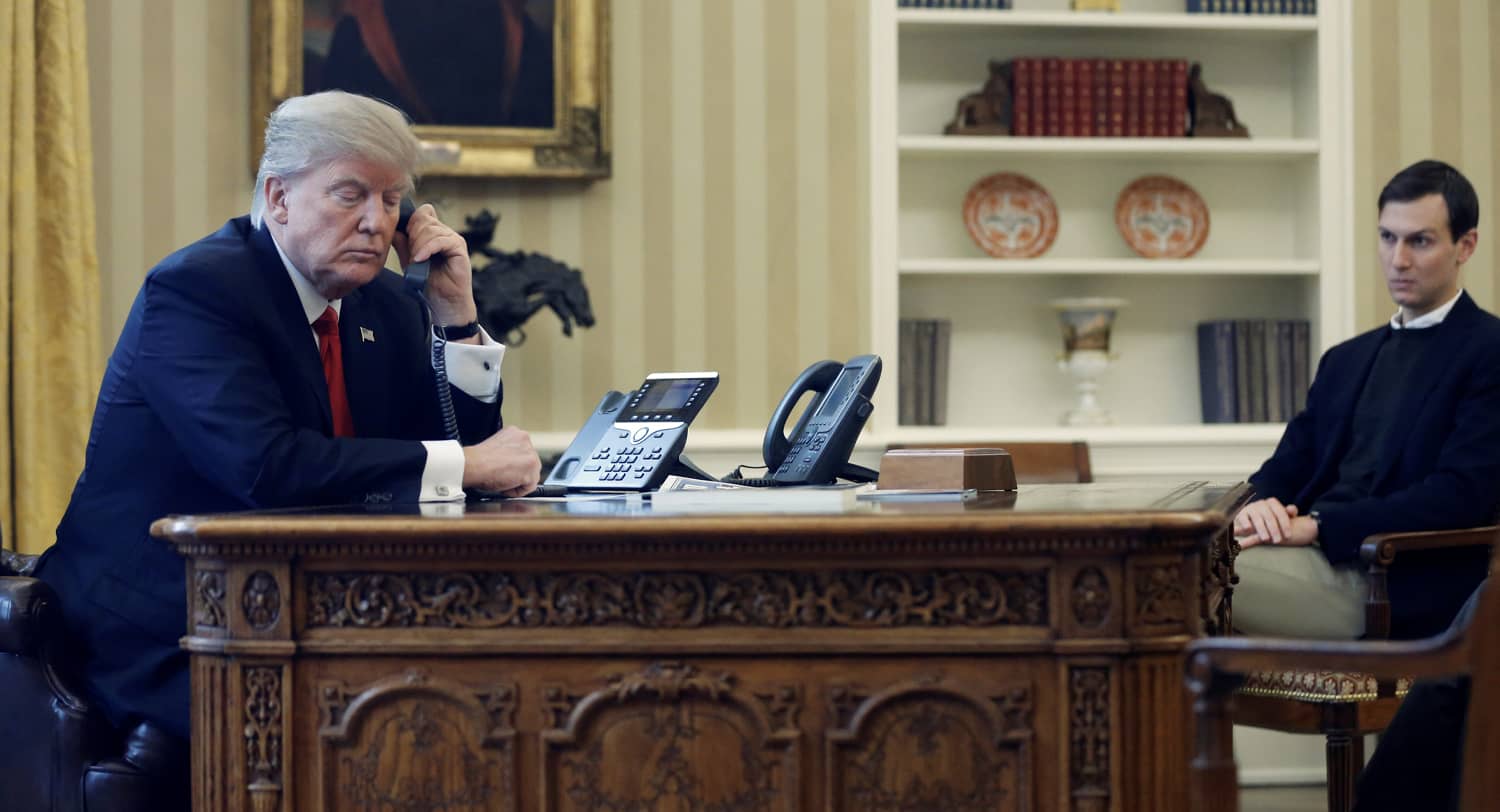As we approach the two-year anniversary of a phone call that changed the Middle East, it is important to understand the impact and potential of the Abraham Accords. August 2020 was a dark time, as COVID-19 had already brought a good part of the world to a halt.
On August 13, 2020, American officials gathered in the Oval Office as President Trump hosted a conference call between Israel’s Prime Minister Benjamin Netanyahu and the then crown prince of the United Arab Emirates, Sheikh Mohammed bin Zayed. I remember that at least 20 people were present, because that was the first time I had been in a closed room with so many others in nearly six months. The phone call was not very long, and it included the traditional challenges of a conference call—of people speaking over one another and the difficulty of hearing clearly. Yet the echo of that phone call still resonates today and will continue to reverberate throughout the Middle East and the world for years and decades to come.
The underlying premise of the phone call was that leaders have the ability to determine if the past will dictate the future. Sheikh Mohammed bin Zayed took a courageous decision that day—that the past would not dictate the future and that the UAE would lead the process of normalizing relations with Israel. Since then, the US administration has changed, Israel has had two new prime ministers, and Mohammed bin Zayed is now the president of the UAE. In addition, Israel faced a round of conflict with Hamas in Gaza in May 2021, heightened internal tensions during Ramadan in 2022, and an increase in terrorism. The Abraham Accords have already been put to the test harder and faster than previous Arab–Israeli peace agreements and in a much shorter period of time. And now, as we approach the two-year anniversary of these accords, it is clear that they are an unmitigated success that should be embraced, praised, and invested in.
This raises the questions as to how the Abraham Accords came about and why they have endure, despite the early tests they faced. On June 25–26, 2019, Jared Kushner, a senior advisor to the president, laid out a new way to look at the Middle East in the Peace to Prosperity Workshop in Bahrain. At the workshop, Kushner brought together dozens of Arab and Muslim leaders along with some of the most prominent businesspeople from across the world to roll out an economic plan for the Palestinian people. Released at this workshop was a comprehensive 100-plus page plan that described how a $50 billion investment in the Palestinian people could help them become independent. Essentially the plan demonstrated in granular detail how the Palestinians could transition from reliance on international aid to economic self-sufficiency.

Photo credit: REUTERS
Much of the leadership of the Middle East and North Africa showed up at the Bahrain workshop, excited about a new approach to this decades-old conflict. The Palestinian leadership—often portrayed as moderate peace seekers—boycotted the workshop. There were, however, nine brave Palestinian businesspeople who attended the conference and who were treated as the rock stars of the event. Unfortunately, they and their families received death threats for attending an event where the international community contemplated the best way to invest $50 billion in their communities. And this was in economically good times. The Palestinian approach did not change during the COVID-19 pandemic, and it still has not come around during this economic downturn.
The Bahrain workshop in 2019 demonstrated in concrete terms that there are ways for the region to work together for the betterment of all people. The absence of a perfect solution should not prevent progress in the region. Kushner and his team did an impressive job of holding up Israel as a model for economic growth and technological innovation. This is critical because while outsiders may perceive the Middle East as monolithic, it is comprised of dozens of countries each with its own interests and agendas. Many of those countries are ultra-competitive with each other, and the Bahrain workshop demonstrated that the Palestinians were missing out on a golden opportunity by not benefiting from the Israeli engine for growth. What was left unsaid but was clear, nonetheless, was that other countries who had not yet normalized with Israel would benefit significantly from a real relationship with Israel.
Three years after the Peace to Prosperity Workshop, senior diplomats from Bahrain, the UAE, Morocco, Egypt, the US, and Israel gathered again in Bahrain on June 27, 2022, some three months after a meeting between the foreign ministers of these countries in Sde Boker, Israel. This was a group dedicated to spurring on the Abraham Accords. What made this latest meeting so remarkable is that the news media no longer considers it remarkable. Three years ago all of the mainstream media had one of two predictions: either Kushner was going to light the Middle East on fire or he was simply wasting everyone’s time on a vanity project. I was personally responsible for bringing Israelis and Palestinians to the Peace to Prosperity Workshop and now, three years later, senior officials from the above-mentioned countries meet regularly to cultivate the accords. Remarkable indeed.
Middle East peace has long been touted as one of the impossible feats that would never be accomplished. From August 13 to December 23, 2020—little more than a year after the Bahrain Peace to Prosperity Workshop—Israel normalized relations with the UAE, Bahrain, Sudan, Morocco, as well as Kosovo, a Muslim-majority nation in Europe. Led by the US, these agreements took place so quickly that the world outside of the Middle East and North Africa has hardly had time to understand what has happened. The primary reason why the Abraham Accords have not received their due praise and subsequent peace dividend is political. President Trump and his team created the platform and opportunity for these unique deals to come to fruition—and to praise the deals would be a tacit approval of President Trump.
I had the opportunity to lead the first negotiations between Emiratis and Israelis, not at the highest leadership level, but at the practical level of how to put the vision of the leadership into practice, and during a pandemic no less. Watching these agreements turn into relationships and then into true warm peace was wonderous to see. I recently wrote a book called Let My People Know about the Abraham Accords and the prospects to further them in the region and beyond. The goal of my book is to show that the Abraham Accords are a win-win case in international agreements and bedrock support for them should become core US policy across the political aisle.
From my perspective, the most powerful picture of 2020 was Israel’s national carrier, El Al, landing at the Abu Dhabi airport, being greeted by Emiratis in traditional thobes. This image was powerful because it showed the world that the impossible was possible. Just 15 days before the El Al plane landed in Abu Dhabi, there had never been any formal connections between Israel and the UAE. Furthermore, since mid-March much of the world’s air travel had been halted due to the COVID-19 pandemic. Now Israel’s national plane was flying over the Kingdom of Saudi Arabia, landing in Abu Dhabi, the capital city of the UAE, and its passengers being greeted as official guests of the country. To say that this was unexpected would be a meaningful understatement.

Photo credit: REUTERS
When we arrived at the special VIP airport, a presidential level motorcade was waiting for us. Jared Kushner, Avi Berkowitz, and their White House team went with Meir Ben Shabbat, Israel’s national security advisor and the head of the Israeli delegation to meet with Sheikh Tahnoon bin Zayed, the head of delegation of the UAE normalization process. I remained with 30 or so Israeli director generals of various ministries and their key staff members to begin practical normalization negotiations. We arrived at the St. Regis Hotel where we met 35 Emirati counterparts. This was truly a surreal experience. The Israelis were giddy with excitement, as their government had tasked them to bring structure to this new relationship. The Emiratis were equally enthused about the opportunities before them and were anxious to show their famous hospitality. Yet, the challenge remained as to how to go about this technical normalization. As the senior American in the room, I told the delegations that this was a unique opportunity and that simply being together was a success. I further explained that the primary objectives were to get to know one another, build trust between each other, and form working groups on topics for future follow-up.
We brought the delegations together to show the world that neither COVID-19 nor political instability nor any other obstacle would slow down this unique moment for peace. After a fantastic round robin dinner where I tried to make sure every Emirati could meet every Israeli and vice versa, I was feeling pretty good about the success of this trip. However, at 11 pm that evening I received a phone call from Avi Berkowitz who said that Jared Kushner, Sheikh Tahnoon, and Meir Ben Shabbat had agreed that the Israeli delegation would not return to Israel without completing memoranda of understanding (MOUs) on banking and investments. So at 11:15 that evening we gathered the appropriate members of each delegation and sat in the hotel’s board room on the second floor and agreed that we would not leave that room until we had agreements that were ready to be signed. It took all evening, but by 5:30 am we had two MOUs ready to be signed by the UAE and the State of Israel.

Photo credit: REUTERS
In retrospect, this was a critical turning point in the Abraham Accords. With the right push and motivation, agreements that often took months, if not longer, could be negotiated and signed within hours. This served as an incredibly powerful symbol. The Abraham Accords were not going to creep along at the snail’s pace of standard international negotiations. They were going to accelerate as quickly and efficiently as possible. This showed both the UAE and Israel the significance of this opportunity, while it also signaled to the world that these agreements were not formalistic or superficial, but meaningful and transformational.
Although the Biden administration has welcomed the Abraham Accords, it has not invested in them and instead is focusing on other priorities. Nonetheless, the accords continue to stay strong and prevail despite its initial early challenges such as the changes in Israeli governments, the conflict with Gaza, and tensions on the Temple Mount. At the same time, however, the accords have not expanded beyond the original countries secured during the final months of the Trump administration. This proves two points: First, the accords are long lasting and sustainable, even without US stewardship, and second, expansion of the accords will require meaningful US involvement and leadership.
In my book I make the argument that common sense policies led to the foundation where the Abraham Accords could occur. Peace in the Middle East is not a Republican ideal nor is it a Democratic one; rather, it is an American ideal. The American interest is absolutely served by the continued growth and strengthening of these game-changing accords. Meaningful progress will only occur if President Biden and his team look at the Middle East outside of the foreign policy paradigm in which we all have been stuck for decades. Although countries can and will act in their own interests, the paradigm that began at the Bahrain Peace to Prosperity Workshop has continued to this day because the Abraham Accords provide a net benefit for the signatory countries. In due time other countries will realize that they too will benefit meaningfully from the Abraham Accords, and they too will consider joining and reaping the benefits for their citizens. Imagine, all of this progress occurred in just the past three years; imagine what the next three or more can bring.

